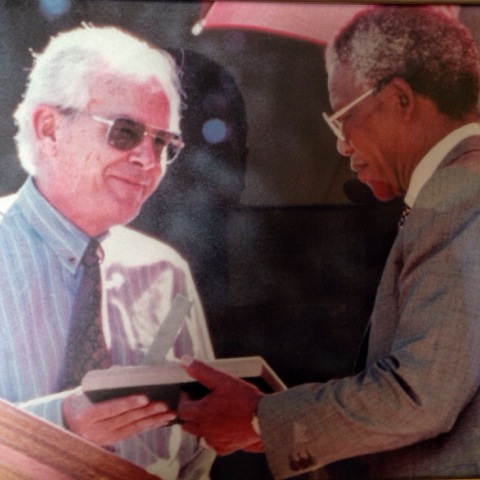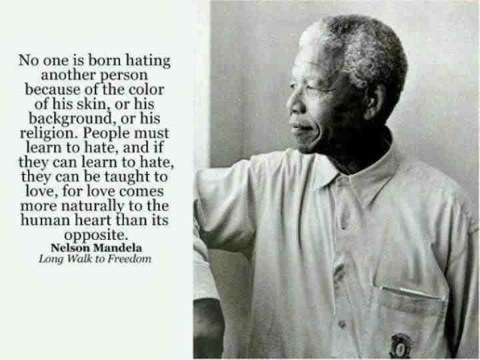The relationship between the Bible and politics has been somewhat controversial over the centuries. There are those who say that intention of scripture is to direct our spiritual lives, as a result, for example, many South Africans were told not to mess with politics during the apartheid era. Then there are those who understand that faith is a fundamentally political - since our faith addresses every aspect of our lives it has a significant impact on every choice and action that shapes life.
I am currently in Uganda to speak at the African Biblical Leadership Innitiative (ABLI) Forum. It is a wonderful group of people who gathered here! I am meeting many of them for the first time. Others I have known for some years. It is such a blessing to be with these sisters and brothers - we share many common objectives and ideals.

The vision of ABLI is to empower leaders (African and elsewhere) with Biblical truths that will foster integrity and justice in the world. ABLI is working to raise up leaders so that nations will be transformed by God’s truth, love and justice. The ABLI forum meets each year just before the meetings of the African Union and it focuses on sharing and discovering a Biblical approach to Good Governance, Conflict Resolution, and Economic Life.
I have the privilege of representing ‘EXPOSED – Shining a light on corruption’ and the Unashamedly Ethical campaigns at ABLI - this invitation came via our coalition partners Micah Challenge. I have opportunities to speak and conduct a workshop with the leaders of the Bible Societies from across the world. This is a significant opportunity to encourage our sisters and brothers to heed the challenge of Micah 6.8 ‘What does God require of you? To act justly, to love mercy, and to walk humbly with your God’.
Among the thoughts that have shaped my input for this wonderful group are these:
Both religion and politics are concerned with how we should organize societies. Yet the tendency for Christians has often been to begin with the politics and work back- wards to find religious rationale for our political beliefs. As a result, most people read the Bible not to challenge our deeply held beliefs, but to affirm the decisions we've already made with our lives.
- Tim Suttle God’s Politics.
As you will see on this blog, I tend to agree with the perrennial view of the Bible, namely that it is critical in shaping our individual and collective lives for justice, peace, mercy and wellbeing (rather than just a source document from which we pluck a few verses to support our individual choices and actions).
Of course such a view is seldom popular, since it does challenge the establishment somewhat. It would seem that much of popular Christianity has a view of Jesus that is something between a personal therapist and a stock broker. I think the loving way of Jesus is far more revolutionary and transformative than that!
When I give food to the poor they call me a saint. When I ask why the poor have no food they call me a communist.
- Dom Helder Camara
I found this quote from NT Wright quite helpful:
The chief political concern of the Scriptures is for God's wise and loving ordering of his world to be operative through humans who will share his priorities, especially his concern for the poor, the weak and the vulnerable. This concern was embodied by Jesus in his inauguration of 'God's kingdom' through his public career and especially his self-giving death, which together set the pattern for a radically redefined notion of power.
— N.T. Wright, New Testament Scholar at University of St. Andrews
I believe that the central political question is the management of public power in order that there should be an economically viable life for all members of the community. Thus justice is front and center and some texts, especially in Deuteronomy, are for the distribution of wealth in order that all may be viable. Obviously such justice is marked by mercy, compassion and generosity. The purpose is to create a genuine neighborhood for all the neighbors.
— Walter Brueggemann, Old Testament Scholar, Columbia Theological Seminary
And of course no post would be complete without quoting something from Stanley Hauerwas!
The chief political concern of the Bible is to worship God truly.
— Stanley Hauerwas, Theologian and ethicist at Duke Divinity School
I agree with this last quote wholeheartedly - the chief political concern of the Bible is to declare and celebrate the worth of God in every aspect of creation. We do so by establishing systems that express God's ways, God's eternal shalom in our economic, political and social policies, as well as in the Church's work of mission and evangelism.
 Children's Choir singing at the opening ceremony at Lake Victoria
Children's Choir singing at the opening ceremony at Lake Victoria
Please could you pray for my family, Megan, Courtney and Liam? I have had a lot of travel in the last few weeks. Please ask the Lord to protect and bless them, to keep them healthy and to continue to provide for all our needs. Please could you also pray for our EXPOSED, Micah Challenge and Unashamedly Ethical teams in South Africa and elsewhere in the world? Please pray that the Lord would give them great love and boldness to stand for His standards of righteousness and justice in the Church, Business and Government. Frequently such a stance comes at great personal cost. Please also pray for me as I travel and have chances to speak and to meet with sisters and brothers. Please pray that God gives me wisdom, humility, conviction, passion and most of all His love for this world and the people and systems He loves and wants to transform. Please pray that I serve our sisters and brothers well at ABLI, and here in Uganda.
Thank you so much for your partnership in the work of God’s Kingdom!
 Tuesday, May 27, 2014 at 6:00PM
Tuesday, May 27, 2014 at 6:00PM 


 Today (10 May) marks the birth of one of the most remarkable and courageous Christian witnesses of our time -
Today (10 May) marks the birth of one of the most remarkable and courageous Christian witnesses of our time - 




